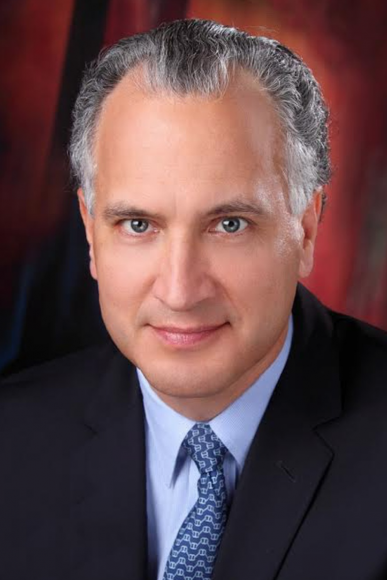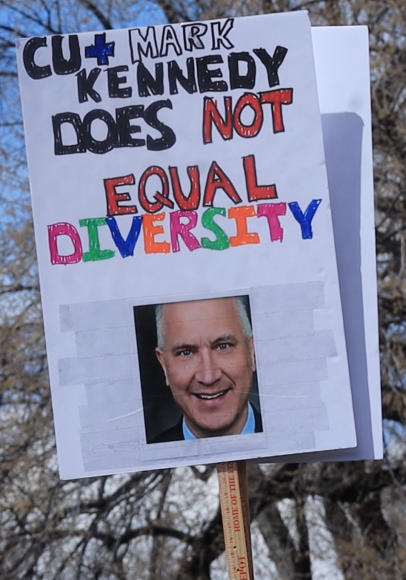
The Board of Regents. Photo courtesy of the University of Colorado.
On April 10, Board of Regents Chair Sue Sharkey formally announced Mark Kennedy as the sole finalist for the position of president of the University of Colorado, which is comprised of four campuses: Boulder, Denver, Anschutz Medical and Colorado Springs. Five other candidates for the position remain unnamed. The Regents have said that revealing the identities of the other candidates could jeopardize their current positions.
The controversial University of North Dakota president and former Republican congressman has fallen under heavy scrutiny from students and faculty for his anti-civil rights voting record and budget cuts while at UND.
The process to find a replacement for outgoing CU president Bruce Benson was criticized from the start. Benson announced his impending departure on July 18, 2018. Shortly after, the Regents developed a search committee to find and present potential candidates. Regents Heidi Ganahl and Irene Griego co-chaired the committee.
According to Regents’ policy 3E, administrative searches must include at least one staff and one student. Student groups raised concerns that the Regents failed to meet this requirement. Initially, the only student on the committee was then second-year MBA student Alex Holmgren, the associate director for the Center for Western Civilization, Thought and Policy.
Students demanded that the Regents find an undergraduate to serve on the committee in order to adequately represent that majority student body, something that was eventually met when University of Colorado Springs undergraduate and Student Body President Sierra Brown was added to aid in the search.
On Nov. 8, 2018, the Regents formally began the search for CU’s next president. Six candidates were ultimately interviewed for two-hour long periods at Denver International Airport. In an email acquired by the CU Independent, Brown states that while the committee had concerns over “some of the ‘things’ that were stated towards [Kennedy],” these were addressed by both the committee and the Regents.
“The truth of the matter is, people DO change, and are allowed to change,” Brown wrote. Brown stated that all candidates underwent “extensive” background and media checks.
After the committee recommended six candidates to the board, it was up to the Regents to decide how many they would interview, which “thankfully” were all of them, wrote Brown. Brown stated that the committee put forward a “vast pool” of candidates, ranging in political ideologies and backgrounds.
However, Brown also stated that there was pushback against Kennedy in particular within the committee, albeit small.
“Diversity and sustainability have stayed in the forefront of OUR minds, as well as MULTIPLE other committee members and the Regents themselves,” Brown wrote. “I’d be a fool to even slightly say that it wasn’t a question/topic that was reoccurring for all of us, and at the end of the day—the Regents unanimously decided to continue on with Kennedy.”
Brown wrote that Kennedy’s experience will be good for leading CU but admits that controversies need to be “dealt with when dealing with any position of power.”
Regents assure that Kennedy’s vetting period following his announcement has been and continues to be comprehensive. Regent Lesley Smith (D-at large) listed in an email to the CUI a number of measures being taken including: checking references, hosting forums on all campuses, setting up meetings with various groups and collecting feedback from the CU community through an electronic survey.
Smith herself said she would “attend as many forums as possible to see how Mark handles himself and to see how he is received.”
“I will be evaluating all data before making a final decision,” Smith wrote.
“Political compromise”
The unanimous decision to elect Kennedy as the sole finalist was a “political compromise,” believes second-year CU law student Dana Steiner.
The Regents are a political body, composing of four Democrats and five Republicans. Steiner said that Kennedy may “look good on paper” because of his business record, which she believes may have been enough to cause the Democratic Regents to vote in his favor. But Kennedy’s presentation as a bipartisan is hard for Steiner to believe, citing that Kennedy voted with then-President George W. Bush 92% of the time.

Mark Kennedy. Photo courtesy of the University of North Dakota.
“The things that [Kennedy] is noted for being bipartisan on are known as bigoted today,” Steiner said. “Just because bipartisanship was bigoted in 2003 doesn’t mean that it’s a type of bipartisanship that we want today.”
Steiner understands that if she were a business student, she’d be “pumped.” Kennedy poses no threat to cutting programs like Leeds, believes Steiner, and will bring a lot to the business school.
“But that’s just such a small portion of our student body,” Steiner said. “I think that there needs to be more in favor of him than just bringing a lot to our business school.”
Steiner said that Kennedy may have given “really good” interview answers to the Regents, but said she has yet to hear a response from Kennedy she feels is “adequate” enough regarding his controversies.
“I don’t think that he’s good at giving direct answers because I think that he’s a politician who’s on his way to the top,” Steiner said. Steiner quotes Kennedy as saying a CU presidency would be the “capstone” of his career. Steiner has a hard time believing this, saying Kennedy has “never held a job for more than four-and-a-half years.”
Possible outcomes
Less than two weeks remain until the Regents choose to officially confirm Kennedy as the next president on May 2. As the deadline approaches, students are urging Regents to block Kennedy’s presidency. Last week, several hundred students gathered on Norlin Quad to protest Kennedy’s candidacy and the Regents’ selection process. Now, students are pursuing several options for avoiding a Kennedy presidency. One outcome is for an interim president to be appointed by the Regents.
Steiner explained that should the Regents choose to indefinitely delay the final vote and Bruce Benson leaves, Regents Chair Sue Sharkey would appoint a temporary president from a pool of current chancellors and vice chancellors of the CU campuses. This temporary president would only serve for up to five days before the Regents, by majority vote, would appoint an interim president indefinitely.
Speaking to the students who are currently organizing to block Kennedy’s presidency, Steiner said she is a “realist” and does not believe that the Regents will “start the process over again.” Should an interim president be appointed, it will most likely be Kennedy, said Steiner.

A student protestor holds a sign during a rally on Norlin Quad. April 15, 2019. (Robert Tann/CU Independent)
Another option that students are pursuing is forcing Kennedy to withdraw his candidacy, something Steiner also believes is unlikely. Kennedy announced he was “excited for this new opportunity but sorry to leave UND.” Following this, UND Chancellor Mark Hagerott said he accepted Kennedy’s “de facto notice of resignation.” Kennedy responded, saying he “has not resigned.”
“[Kennedy] is very self-confident and brazen about his abilities and his skills,” Steiner said. “I don’t see him being willing to [pull his candidacy] because he certainly thinks that he’s changed and he thinks he’s qualified.”
The third avenue that students are pursuing is making their case against Kennedy and flipping Regents to vote against his confirmation. Steiner said that with the power the Regents have, they could “easily vote” not to have Kennedy as the next president and could instead return to vetting the other five unnamed candidates.
However, a majority vote against confirming Kennedy would also punt the decision back to the search committee, which may wish to explore different options.
“In order to succeed in actually having a president, [the Regents] are either going to need to dig their heels in for Kennedy, or be willing to approve someone who the students approve of,” Steiner said.
Contact CU Independent Senior News Editor Robert Tann at robert.tann@colorado.edu.
